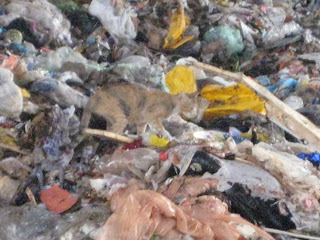Last week was definitely a week of firsts. I'll list, then go into more detail:
- First time leading Shacharit in the minyan
- First time giving a d'var tzedek
- First time visiting a dump
7:25 Sunday Shacharit
7:10 Monday Shacharit and Torah Service
7:25 Tuesday Shacharit
7:10 Wednesday Super Singy Shacharit!
7:25 Thursday Shacharit and Torah service
I led Super Singy Shacharit (that's not its official name, but it should be), with lots of great melodies from Jewish communities in my past like Coleman and BCI. Ever since then, I've been thinking a lot about what it means to be a shaliach tzibur - the prayer leader, but literally, the representative of the community. It's quite a challenge, pacing yourself, remembering different melodies and nusachot, but the real challenge is feeling fit to convey the needs of the community to G-d. In the traditional halakhic view, the shatz has the power to fulfill the obligations of others in prayer, and this was a concern in places where the community didn't know Hebrew and didn't understand the prayers they were reciting. Obviously this is still a concern for us today when davening in "lashon kodesh" (the holy tongue), but now that most siddurim have the translation of the prayers readily accessible, we can understand the words that we're saying to G-d and find ways to connect one's individuals thoughts and feelings with the fixed words in the liturgy.
2. In the Social Justice Track, each person is asked to give a "dvar tzedek" once over the course of the semester - literally a "word of justice," or a short talk on a topic of social justice that you're particularly passionate about. It didn't take me long to come up with a topic - I spoke about my mom and her role in the fight against child abuse. I try not to write out my speeches verbatim beforehand so I can't provide the exact text of what I said, but I would like to include the text that I ended with that I think sums up the issue - a letter that my mom wrote to the editor of the Spartanburg Herald Journal two years ago:
We have been into the new century for almost seven years now, and things have certainly changed. Cell phones have become universal, MP3 players are playing our favorite tunes, and the Internet connects us to everywhere.
So far so good, but from my perspective the future doesn't look quite as bright. Child abuse has clearly entered into every arena - the streets, the home, the church and the school. Children are being abused by their guardians, their grandparents, their neighbors, their teachers, their ministers and even their older siblings. Sound crazy? Who needs to watch reality TV? The stories I hear every day far surpass those shows.
I often wonder why people are so quick to believe that adults tell the truth and children lie. Oh, and as for our advancement in technology, our cell phones are now used as cameras for pornography, folks are waiting for DNA and don't want to hear what their children are saying, My Space.com has become a common arena for adults to have sexual conversations with children, and young teens are experimenting on their younger siblings.
Unless we are willing to realize that these situations are happening every day, everywhere, which also includes our community, we will never have a healthy society. The Department of Social Services and local law enforcement are inundated with these cases to investigate. We all need to open our eyes and work together to try to get a handle on this monumental problem.
Our future depends on it.
Nancy Henderson
Medical director,
Spartanburg and Greenville Children's Advocacy Center
3. The dump. Or Har Chiriya, the mountain of beauty (in Arabic). Here, I believe pictures speak much louder than words.
Soccer field area where small trucks from cities bring the trash and large trucks take the trash away to its final resting place in the Negev.
Big truck pushes trash from one side to the other.
Cats jump in and enjoy the free dinner, just as they do in dumpsters all over Jerusalem.
And on that note... it's bedtime!



No comments:
Post a Comment